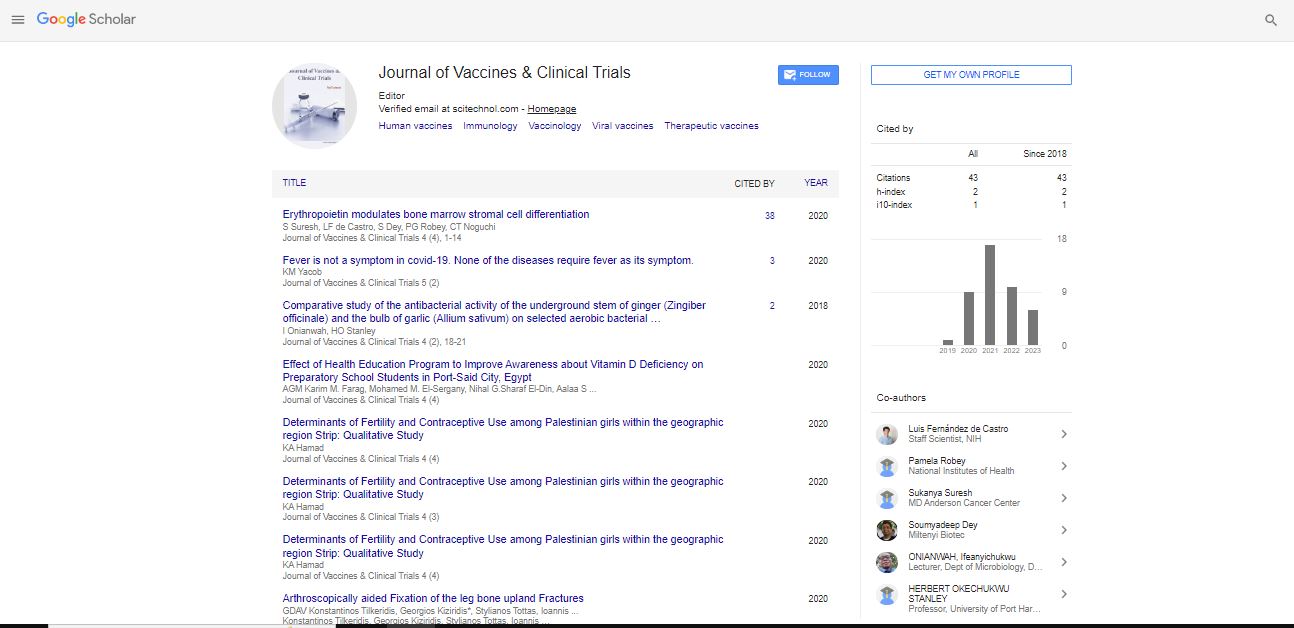Perspective, Jou Of Vac Cli Tr Vol: 7 Issue: 3
The Role of Immunology in Vaccine Safety and Effectiveness
Vogelgesang Portnoy*
1Department of Medicine, University of Cincinnati College of Medicine, Cincinnati, Ohio, United States of America
*Corresponding Author: Vogelgesang Portnoy,
Department of Medicine,
University of Cincinnati College of Medicine, Cincinnati, Ohio, United States of
America
E-mail: vogekport@uc.edu
Received date: 28 August, 2023, Manuscript No. JVCT-23-118129;
Editor assigned date: 31 August, 2023, PreQC No. JVCT-23-118129 (PQ);
Reviewed date: 14 September, 2023, QC No. JVCT-23-118129;
Revised date: 21 September, 2023, Manuscript No. JVCT-23-118129 (R);
Published date: 28 September, 2023, DOI: 10.4172/JVCT.100084
Citation: Portnoy V (2023) The Role of Immunology in Vaccine Safety and Effectiveness. Jou of Vac Cli Tr 7:3.
Description
Vaccines are one of the most effective tools in modern medicine for preventing infectious diseases and protecting public health. Immunology, the study of the immune system, plays a central role in understanding how vaccines work, ensuring their safety and assessing their effectiveness.
In essence, vaccination leverages the principles of immunology to stimulate and prepare the immune system to recognize and combat specific pathogens. The immune system is an intricate network of cells, tissues and molecules that work together to defend the body against infections. It is divided into two primary branches: the innate immune system, which provides rapid, nonspecific defense against a wide range of threats and the adaptive immune system, which offers a highly specific and long-lasting response.
The key to an effective vaccine lies in the choice of immunogens, which are substances that can elicit an immune response. Most vaccines use weakened or inactivated pathogens, pieces of pathogens or synthetic versions of pathogen components to mimic an infection without causing the disease itself. These immunogens are called antigens.
When a vaccine is administered, the immune system recognizes these antigens as foreign invaders, initiating an immune response. The adaptive immune system generates memory cells that "remember" the pathogen and can mount a quicker, more effective response if the individual is exposed to the actual pathogen in the future. This immunological memory is what makes vaccines so powerful in preventing diseases.
Safety is a paramount concern in vaccine development. Immunologists play a vital role in assessing and ensuring the safety of vaccines. Extensive analysis and clinical trials are conducted to evaluate the potential side effects and adverse reactions of vaccines.
Immunologists work to understand how different vaccine components interact with the immune system. By analyzing the immune response, they can identify and mitigate any adverse effects. Safety monitoring continues even after a vaccine is approved for use to detect rare or unexpected adverse events. This ongoing vigilance is a fundamental aspect of vaccine safety.
Immunologists play a vital role in vaccine development by studying the immune response's strength and specificity. Vaccines typically aim to stimulate antibody production, which circulate in the bloodstream to neutralize pathogens. However, some vaccines, like live attenuated ones, also promote cellular immunity, where immune cells directly attack infected cells. Customizing the immune response to the pathogen's characteristics is vital in vaccine design; for instance, respiratory viruses may need a robust upper respiratory tract antibody response, while intracellular pathogens like tuberculosis demand strong cellular immunity.
Vaccine immunology revolves around immune memory, where B and T cells "remember" pathogen antigens after vaccination, providing long-term protection. Immunologists assess the persistence and quality of this memory to determine vaccine effectiveness. Booster doses may be needed to refresh memory for some vaccines, ensuring continued immunity.
Immunologists explore factors impacting vaccine efficacy, including genetic, age, health and environmental variations in immune responses. This knowledge is vital for customizing vaccination strategies to diverse populations. For instance, in older adults, vaccine responses may be less robust, requiring potential adjustments in formulations and schedules to bolster efficacy.
Immunology is pivotal in monitoring and responding to emerging pathogens and potential immune escape as viruses mutate and evolve. Immunologists closely track these changes and update vaccines to tackle new variants. The COVID-19 pandemic exemplifies this, with vaccines initially targeting the SARS-CoV-2 spike protein and booster shots addressing new variants, highlighting vaccine immunology's adaptability.
Herd immunity, rooted in immunology, arises when enough of the population becomes immune to a disease through vaccination or prior infection, curbing pathogen transmission. Immunologists offer expertise in determining the necessary immunity levels for various diseases. They also play a vital role in crafting immunization strategies, shaping vaccination schedules, target groups and distribution methods to safeguard communities.
Conclusion
Immunology is the cornerstone of vaccine development, safety and effectiveness. It informs the selection of immunogens, the assessment of vaccine safety and the understanding of immune responses to vaccines. The ongoing collaboration between immunologists, healthcare professionals and public health experts is important in the development and deployment of vaccines that protect individuals and communities from infectious diseases.
 Spanish
Spanish  Chinese
Chinese  Russian
Russian  German
German  French
French  Japanese
Japanese  Portuguese
Portuguese  Hindi
Hindi 